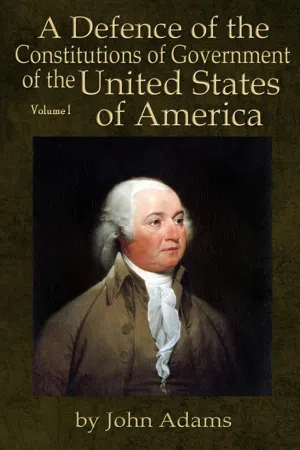
A Defence of the Constitutions of Government of the United States of America
Volume I
- English
- ePUB (mobile friendly)
- Available on iOS & Android
A Defence of the Constitutions of Government of the United States of America
Volume I
About this book
Available for the first time in a modern and readable edition!
Preceding The Federalist by several years, this first volume of John Adams' A Defence of the Constitutions of Government of the United States of America is a profound work of political and governmental theory.
What prompted Adams to write such a remarkable treatise was a letter, a letter exchanged between a French statesman and a Welsh philosopher, between Anne-Robert-Jacques Turgot and Dr. Richard Price. In his letter, Turgot criticized the constitutions of government that several of the American states had adopted since their separation from Great Britain. In Turgot's view, their governments too much resembled the British government, with its king, lords and commons. Turgot advocated a much simpler form of government, a government as democratic as possible, consisting of a single assembly of representatives.
Meanwhile, in America, the Congress established under the Articles of Confederation (a single assembly with little check or balance) was failing as the national government of the United States. And to address the institutional failures of this single-assembly "government, " the several states had appointed delegates to meet in convention at Philadelphia, to devise "a more perfect union."
Thus, Adams' Defence, published in three volumes beginning in early 1787, could not have been more timely, for in addition to a vigorous defense of the several American constitutions, Adams also provided the Philadelphia delegates with a much-needed reference manual on republican governments.
Inspired by events in Europe and influencing events in America, Adams' extensive work is a partial history of man's eternal struggle to control power, and can serve for all time as a guidebook on the means to keep a people free.
Frequently asked questions
- Essential is ideal for learners and professionals who enjoy exploring a wide range of subjects. Access the Essential Library with 800,000+ trusted titles and best-sellers across business, personal growth, and the humanities. Includes unlimited reading time and Standard Read Aloud voice.
- Complete: Perfect for advanced learners and researchers needing full, unrestricted access. Unlock 1.4M+ books across hundreds of subjects, including academic and specialized titles. The Complete Plan also includes advanced features like Premium Read Aloud and Research Assistant.
Please note we cannot support devices running on iOS 13 and Android 7 or earlier. Learn more about using the app.
Information
Table of contents
- Preface
- Letter I. Preliminary Observations
- Letter II.
- DEMOCRATICAL REPUBLICS
- Letter IV. Biscay
- Letter V. Switzerland
- Letter VI. Underwald
- Letter VII. Glaris
- Letter VIII. Zug
- Letter XIX. Uri
- Letter X. Switz
- ARISTOCRATICAL REPUBLICS
- Letter XII. Fribourg
- Letter XIII. Soleure
- Letter XIV. Lucerne
- Letter XV. Zurich
- Letter XVI. Schaffhause
- Letter XVII. St. Gall
- Letter XVIII. Lucca – Genoa
- Letter XIX. Venice
- MONARCHICAL REPUBLICS
- Letter XXI. Poland
- Letter XXII. Neuchatel
- Letter XXIII. Recapitulation
- ANCIENT REPUBLICS, AND OPINIONS OF PHILOSOPHERS
- Letter XXV. Dr. Franklin
- Letter XXVI. Dr. Price
- MIXED GOVERNMENTS
- Letter XXVIII. Montesquieu
- Letter XXIX. Harrington
- Letter XXX. Polybius
- Letter XXXI. Polybius
- Letter XXXII. Dionysius Halicarnassenis – Valerius
- Letter XXXIII. Plato
- Letter XXXIV. Sir Thomas Smith
- ANCIENT DEMOCRATICAL REPUBLICS
- ANCIENT ARISTOCRATICAL REPUBLICS
- ANCIENT MONARCHICAL REPUBLICS
- Letter XXXVIII. Homer – Phaeacia
- Letter XXXIX. Homer – Ithaca
- Letter XL. Lacedaemon
- Letter XLI. Athens
- Letter XLII. Antalcidas
- Letter XLIII. Achaia